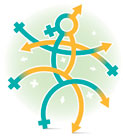Question marks with a purpose
Philosophy workshop stresses the importance of asking in order to know better

True philosophers know that to get any useful answer you must first ask the right questions. On May 12 and 13, scholars were invited by the Department of Philosophy to present papers-in-progress that explore the contentious and complex themes of gender/sex relations as part of a workshop called "Philosophical Conceptions of Sexual Difference and Embodiment." Students, academic guests and the general public were invited to attend and ask questions that could help clarify the direction of the papers. The result was a fascinating mix of ethical and scientific questions that challenge our current conceptions of sexual difference and expand the parameters within which we normally think of our bodies. Here we take a look at three topics and the questions they generated.
Natural disasters are human, too
What knowledge would have minimized the impact of Hurricane Katrina? Do our current conceptions of nature versus culture blind us to such disasters?
Nancy Tuana thinks so. The Pennsylvania State University professor of science studies in philosophy was so moved by the hurricane's devastation that she changed the direction of a paper she was working on to consider how we separate nature and culture. Tuana argues that a blend of human actions and natural phenomena cause disasters like Katrina, which are prompted by factors such as deforestation, industrialization and greenhouse gas emissions.
What do Katrina's devastating effects reveal about conceptions of sexual difference? At first glance, not a lot. But in Tuana's view, Katrina highlights the responsibility we have towards the distinctions we create to facilitate knowledge, whether they be nature/culture distinctions or sex/gender distinctions. To better understand our role in natural disasters, we must appreciate the relationship between seemingly fixed categories like nature, culture and biology. Social and natural realities collided in the case of disadvantaged New Orleanians who, being unable to afford evacuation costs, faced the full impact of Katrina.
Our separation of nature and culture must change, Tuana stresses, so we can strengthen our ability to predict and constructively respond to natural crises.
"Normal" is not a synonym for "happy"
Is looking normal the key to happiness? Should those who allegedly look "abnormal" have their appearances surgically corrected and, if so, are doctors really best suited to determine what's "normal"?
In her paper "The Body in Question: Shame and Disgust in the Medical Management of Intersex," American University professor Ellen K. Feder explores atypical genitalia - the mixture of female and male reproductive structures in one person - and the heated ethical debate surrounding corrective surgery for such conditions.
On the one hand, doctors who graciously perform these surgeries are well-intentioned professionals determined to help ensure that their patients lead healthy lives. On the other, doctors who insist on corrective surgery suggest that living with difference is unbearable - even disgusting - and that quality of life depends on adhering to norms.
Feder fears that when it comes to questions of intersex, the current standard of care violates important ethical principles. Her research shows that medical intervention can cause more pain than gain, because patients inevitably experience shame when told they are abnormal and need "fixing." She questions whether this shame reflects a wider socio-medical tendency towards manufacturing disgust about bodies, one that motivates drastic - and unnecessary - cosmetic surgeries that range from facelifts to limb lengthenings.
Feder wonders in whose interest corrective procedures are being performed. Are they for the benefit of the patient, the doctor or the parents who want their child to fit into an appearance-obsessed society? Perhaps the solution, she argues, is not to "normalize" intersex bodies through surgical change, but to advocate a more generous attitude towards body differences in general.
Sex is accidental - oops!
Why have only one sex when we can have two? Is our sex accidental in the same way that the size and shape of our nose are accidental?
In answering these questions, McGill's Marguerite Deslauriers travels back in time to consider Aristotle's biology. Her paper, "No-sexed and Two-sexed: Eunuchs and 'Tragainai' in Aristotle's Biology," offers insights into the mind of a man often referred to as the father of the public-private dichotomy. Deslauriers argues that while sex designation is important for Aristotle, it does not permeate the entire body. In fact, we are not male or female except for our reproductive parts - everything else, from our hearts to our eyes, is unrelated to our sex. It follows, then, that sex is accidental: whether we were born male or female is without consequence to the rest of our selves. And so, sex, just like noses, ears or hair colour, is a feature that we acquire from one of our parents.
With this in mind, Deslauriers considers Aristotle's view of no-sexed and two-sexed individuals, the so-called "eunuch" (a man whose testicles have been removed) and "tragainai," individuals born with both male and female genital parts. Are these individuals any less human because their sex is atypical? For Aristotle, they are not inhuman, but merely imperfect products of nature. Being born without or with an extra genital part is no different than being born without or with an extra finger.
What are the implications of this biological conception for Aristotle's politics? Since sex is merely a bodily accident, Deslauriers argues it cannot be used as a basis for sex discrimination. Accordingly, Aristotle's positioning of men in the public sphere and his relegation of women to the private sphere is not rooted in his sex biology. The inequality of the sexes in Aristotelian politics has other origins.
Read all six workshop papers at www.mcgill.ca/philosophy/workshop.

